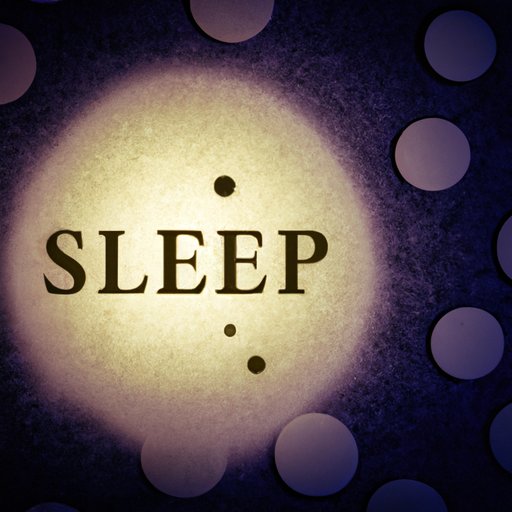
Introduction
Have you ever spent hours tossing and turning, unable to fall asleep no matter how hard you try? Do you find yourself waking up numerous times throughout the night, unable to stay asleep? If so, you may be suffering from insomnia, a common sleep disorder affecting millions of people worldwide. Lack of sleep can have a significant impact on your overall health and wellbeing. It’s crucial to understand the causes and symptoms of insomnia and explore various remedies to improve your sleep quality. This article aims to provide solutions to help those experiencing problems with sleep to achieve better rest.
Understanding Insomnia: What are the Causes and Symptoms?
Insomnia refers to a sleep disorder characterized by difficulty falling or staying asleep. Insomnia can be short-term or long-term, depending on the duration of sleeplessness. Short-term insomnia is typically caused by stress, anxiety, jet lag, or a change in sleep habits. Long-term insomnia may be due to medical conditions, medications, or mental health disorders.
Common causes of insomnia include:
- Stress and anxiety
- Depression or other mental health conditions
- Poor sleep habits, such as watching TV or using electronic devices in bed
- Medical conditions, such as chronic pain, asthma, or sleep apnea
- Medications that interfere with sleep, such as antidepressants or asthma medication
Symptoms of insomnia may include difficulty falling asleep, waking up frequently during the night, waking up too early in the morning, and feeling tired or unrefreshed after waking up. If you experience these symptoms for more than a few weeks, you may have insomnia and should seek treatment from a doctor or sleep specialist.
No Sleep? No Problem: Natural Remedies for Restlessness
Natural remedies for insomnia can be a useful and effective way to treat sleeplessness without medication. Many people prefer natural remedies as an alternative to sleeping pills since they are often non-habit-forming and have fewer side effects.
Some natural remedies that can help with restlessness include:
- Herbal supplements, such as valerian root, melatonin, and chamomile tea
- Relaxation techniques, such as yoga or stretching before bed
- Aromatherapy, including lavender essential oil or a calming scent diffuser
Sleepless Nights: How to Calm Your Mind and Improve Your Sleep
The mind plays a critical role in our ability to fall and stay asleep. Stress, anxiety, and overthinking can all contribute to sleeplessness. Fortunately, there are several techniques to help alleviate a racing mind and calm the body to promote better sleep.
Some techniques to help calm the mind include:
- Meditation or mindfulness practices
- Deep breathing exercises
- Guided imagery or visualization exercises
Tired of Counting Sheep? Explore These Innovative Products
Innovative sleep products can help you track and improve your sleep quality. These products range from mattresses and pillows to sleep tracking devices and white noise machines. Using these products can help you identify patterns and behaviors that may contribute to your restlessness and find ways to improve your sleep hygiene.
Some innovative sleep products to explore include:
- Sleep tracking devices, such as Fitbit or Oura Ring
- White noise machines to block out noise and promote relaxation
- Weighted blankets that provide gentle pressure to promote relaxation and reduce anxiety
Sleeping Pills: Are They Really the Answer?
Sleeping pills are a common treatment for insomnia but are not always the best choice. While sleeping pills can be effective in treating short-term sleeplessness, they can be habit-forming, and long-term use can lead to dependence and other side effects.
Alternative solutions to sleeping pills may include cognitive-behavioral therapy, lifestyle changes, and over-the-counter sleep aids. Cognitive-behavioral therapy involves changing negative thought patterns and behaviors that may be contributing to insomnia. Lifestyle changes may include adjusting sleep habits, such as avoiding caffeine, establishing a regular sleep schedule, and reducing screen time before bed. Over-the-counter sleep aids, such as antihistamines, can also be effective in treating short-term insomnia.
The Impact of Sleep Deprivation on Your Physical and Mental Health
Sleep deprivation can have significant consequences on your overall health and wellbeing. Lack of sleep can contribute to a weakened immune system, weight gain, and an increased risk of developing chronic conditions such as diabetes, heart disease, and depression. Poor sleep can also affect cognitive function, making it difficult to concentrate or remember information.
It’s essential to prioritize sleep as part of your overall health and wellness plan and take steps to improve your sleep quality.
How to Create a Relaxing Sleep Environment and Achieve Sweet Dreams
The environment you sleep in can have a significant impact on your sleep quality. A comfortable and relaxing sleep environment can enhance sleep quality and promote restfulness. It’s essential to create a space that is calming and conducive to sleep.
Some tips for creating a relaxing sleep environment include:
- Darken the room by using blackout curtains or an eye mask
- Reduce the noise level by using earplugs or a white noise machine
- Keep the temperature cool by using a fan or adjusting the thermostat
Conclusion
Good sleep is essential for overall health and wellbeing. Insomnia affects millions of people worldwide, and lack of sleep can have significant consequences on physical and mental health. This article has provided several solutions to improve sleep quality, including natural remedies, relaxation techniques, innovative sleep products, and creating a relaxing sleep environment. It’s crucial to take steps towards better sleep hygiene and prioritize rest to enhance overall health and wellness.





